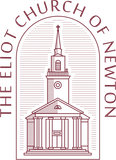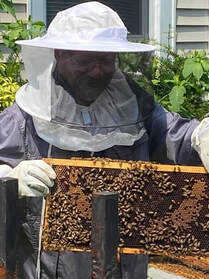Many of us take it for granted that the butterflies, bees, and flowers “come with the property” on which we live. But these insects play an important role pollinating our flowers, and ensuring the supply of fruits, grains, and veggies. Michael Benn grew up in Guyana (British Guiana, South America). There he first learned the beauty and bounty of orchids, mangoes, and nature’s botanical gifts to us. He was first exposed to bees kept by his father who was an agricultural officer for the British Guiana government.
Every spring we labor in our gardens to produce images similar to those shown in the garden catalogs. But alas they succumb to an army of spider mites, aphids, caterpillars, etc. We fight back. Armed with a collection of pesticides, insecticides, and fungicides, and other chemical toxins, we apply these to “protect” our plants. In the process we annihilate the vital pollinators in the garden. Michael has been raising honeybees in his West Roxbury garden for the past three years. This year about 40 pounds of honey was harvested by Michael’s beekeeping mentor and friend, Doug Stuart and his wife Chris. In keeping with recommended agricultural practices, he only took about half of the available honey. The balance is for the bees to consume during the long winter months.
Bees can travel up to three miles to forage for their pollen. His West Roxbury garden is located within a short distance from the trees of the Arnold Arboretum. This gives his honey its unique floral aroma. Your garden can also be a source for pollinators, flowers, and veggies.
Tips to help your pollinators
- Do not introduce those toxic chemicals in your garden
- Seek organic products from places like Allandale Farms in Roslindale. You can also get a wide range of garden supplies.
- Check in with Your friends at Eliot Church.
- Become active in environmental organizations such as the Audubon Society and the Boston Area Beekeepers Association


